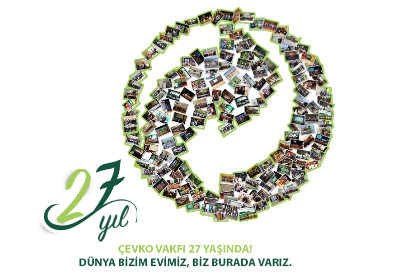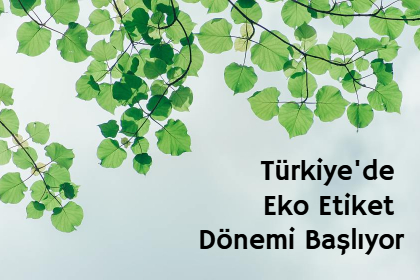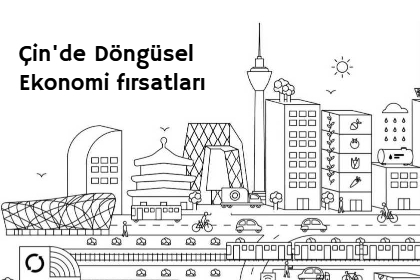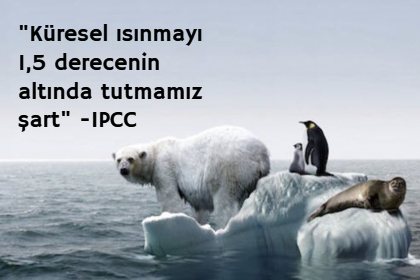News

SUSTAINABLE ENVIRONMENT WIN AWARDS
The Green Dot Industrial Awards were given to the winners at a ceremony held on 29th November 2018. Alongside industrial organizations, media organizations that gave priority to news items informing the public and creating awareness of environment and recycling were also awarded.
Mete İmer, General Secretary of ÇEVKO Foundation pointed out that the Green Dot brand, which includes 540 million consumers in 31 countries, most of which are EU members, is among the most successful application models. He said, “Green Dot symbolizes the responsible producer and the respect and admiration the consumer shows towards responsibility. Our target is to award the organizations which provide the determined criteria at a high level with their works that go beyond their legal responsibilities, and to encourage launching firms to carry out similar works.”
At the award ceremony, which was held as a carbon neutral event, 7 industrial organizations won the Green Dot Industrial Award in 3 different categories, and 7 industrial organizations were given the Green Dot Incentive Award, while 6 media organizations received the Green Dot Press Award. Performer Zeliha Sunal won the Special Award for her contributions to the social information activities of ÇEVKO Foundation.
 The “Zero Waste Regulation Draft,” which covers procedures and principles regarding the establishment of the zero waste management system and the issueing of the zero waste certificate, has been prepared by the Ministry of Environment and Urbanization and is open to reviews until 20th November 2018.
The “Zero Waste Regulation Draft,” which covers procedures and principles regarding the establishment of the zero waste management system and the issueing of the zero waste certificate, has been prepared by the Ministry of Environment and Urbanization and is open to reviews until 20th November 2018.

Dear Stakeholders,
As the scientist Carl Sagan pointed out in his memorable oratory, we all, the whole humanity, with everything that we have produced, with our past and future, with every living and non-living being that we share the planet with, occupy a place on this planet Earth, which, when seen from a far away corner of the space, looks like a pale blue dot. This is our home and we exist here.
The continuation of our existence depends on environmental sustainability. And for a sustainable environment, a sustainable recycling system formed by the contributions of the business world, public administration, local authorities, consumers, and the media, is of the utmost importance.
ÇEVKO Foundation, which started out voluntarily on 1st November 1991 with the recycling of packaging waste to protect the environment, to contribute to the economy, and for social development, continues to apply this sustainable recycling system in the best possible way in Turkey.
ÇEVKO Foundation was declared Turkey’s first Authorized Organization in 2005 and since then has provided the recycling of almost 6 million tons of packaging waste. The steps we have taken for recycling provide the economy of our country with billions alongside having a positive effect on a sustainable environment. The system which we have set up has become a sector with the addition of other newly authorized organizations.
Following our 27-year-old continuous development journey, we are now working on recycling together with 162 county municipalities that have the highest population in Turkey. With our 51 members among whom there are the greatest firms of Turkey, we are fulfilling the recycling obligations of approximately 1,900 companies.
Alongside industrial organizations, together with municipalities, licenced packaging waste collecting-separating and recycling firms, we are providing a reduction in the use of fosil fuels, water, and energy, and a decrease in the consumption of natural resources and energy. With our “Green Dot Industrial Awards” we are rewarding the member companies for their efforts beyond their legal responsibilities. We are also encouraging media organizations that give priority to news items regarding recycling and public awareness with our “Green Dot Press Awards.”
In addition, we have assumed intellectual leadership on Circular Economy, which is a relatively new concept in the world and which deals with the processes of “sustainable production,” “sustainable consumption” and “upward recycling” in the form of a “circle” instead of the “Produce!-Use!-Dispose!” concept. We started the movement in 2017 with a congress and are continuing this year with a series of workshops intended for different sectors.
At the same time, we are working together with all concerned parties, mainly our foundation members for the dissemination of the “Zero Waste” Project of the Environment and Urbanization Ministry of the Turkish Republic.
As for the consumer side, which is the starting point of recycling, we are trying to spread the concept of recovery among the majority of the community to get them to acquire the habit of collecting waste separately at the source. Our aim is to make the consumer see that packaging waste is not garbage but a power to contribute to the sustainable environment. For this purpose, via public spots, commercials, and news studies we are calling on millions of people; we are performing different activities working in collaboration with the public, local government, community, and the industry.
Also, we are organizing trainings for primary school teachers, and theatre plays for children. We are making an effort for recycling to increase by placing in different regions waste collecting bins with different designs, decorated with the works of caricature artists.
We are doing all of these things so that we can sustain our existence on the “pale blue dot” which is our world.
We have come a long way, yet the distance ahead of us is much longer, but this is an exciting journey. I wish to thank all of our stakeholders, our members, local and central governments, leaders of the business world and industry, students and teachers, consumers, whose recycling awareness is growing steadily, for being with us every step of the way.
Happy 27th Birthday ÇEVKO Foundation.
My best regards,
Okyar Yayalar
Chairman
The 4th Food Conference, supported by ÇEVKO Foundation as the bronze sponsor, turned into a platform where all the shareholders of the food sector discussed sustainable food supply and food consumption.
At the conference, Alphan Eröztürk, Director of Public and Foreign Affairs of ÇEVKO Foundation, spoke at the “Managing Food Waste With Zero Waste Target” session and pointed out that the relationship between food and packaging was currently one of the most frequently asked topics. Eröztürk continued, “The packaging used in the transport and preservation of the food is important for the prevention of food waste. We should keep in mind that in order to protect the environment and our resources, the packaging should be collected separately at the source and be recycled. As ÇEVKO Foundation, we are doing our work at exactly this point.”
Eröztürk also said that the perspective of waste and waste management was changing in Turkey. He stressed the importance of reducing the amount of packaging and sending the used packagings to recycling. He ended his talk with “In order to maintain a healthy and sustainable recycling system in Turkey, consumers must also act responsibly and collect packaging waste separately.”

The Eco Label Regulation prepared by the Ministry of Environment and Urbanization was published in the Official Newspaper on 19th October 2018.
The Ministry will give an eco label to products and services whose compliance with the criteria determined according to their reduced adverse impacts on the environment and their product or service group has been proven.
The purpose of the regulation is to encourage throughout the life cycle, products or services whose environmental impact has been reduced; create a volunary eco label system in order to provide the consumers with a true and scientific information flow; and to organize the administrative and technical aspects and procedures and principles regarding the system implementation.
The 5thSustainable Business Awards, which aims to reward the successful sustainable business models, were given to projects that created major effects on social, economic, and environmental issues.
Members of ÇEVKO Foundation L’Oreal Turkey, Mey İçki, and Sütaş were awarded with their projects.
- Co-operation – In the B2B category L’Oreal Turkey was awarded with its Project “Beauty Knows No Obstacles”.
- Mey İçki was rewarded in the Carbon and Energy Management category with the Carbon Footprint Calculation and Reduction Project of Kayra Vintage Wines.
- In the Waste Management category Sütaş received the award with “From Farm to Dinner Table” Value Chain Waste Management Model.

Applying circular economy principles at scale in China’s cities could make goods and services more affordable for citizens, while at the same time making cities more liveable, reducing emissions of fine particulate matter by 50%, emissions of greenhouse gases by 23%, and traffic congestion by 47%, by 2040.
The analysis, which identifies opportunities across five focus areas, built environment, mobility, nutrition, textiles and electronics, shows that applying circular economy principles at scale could save businesses and households approximately CNY 70 trillion by 2040 (16% of China’s projected GDP).
The report was launched in September 2018 at the World Economic Forum's Annual Meeting of the New Champions in Tianjin, China. It was produced by the Ellen MacArthur Foundation in partnership with Arup and McKinsey & Company, supported by UNCTAD and funded by the MAVA Foundation, with feedback from public institutions, academics and business circles in China.
Supported by the country’s leadership on circular economy policies, continuing urbanisation, rapid development of digital technologies, and a boom in asset-sharing platforms, China’s cities are well placed to become internationally-recognised beacons of successful circular economy transitions, the report finds.
Media employees working for the Fox Group Networks carried out an environmental cleaning in collaboration with Kartal Municipality and ÇEVKO Foundation on 27th September at the Aydos Woods.
Within the #21CFImpactWeek activities of Fox carried out simultaneously throughout the world, Fox TV employees were trained by ÇEVKO for a whole week on recycling. Following the trainings, nearly 100 Fox TV employees participated in the Aydos Woods cleaning, and over a ton of packaging waste was collected to be sent to recycling.
The environmental benefits of the recycled packaging waste are as follows;
. With the recycling of 140 kg of paper, cardboard and composite packaging waste, 2 trees were saved from being cut down.
.With the recycling of 350 kg of plastic waste, approximately 263 litres of petrol was saved, which is an amount enough to fill the tanks of 6 vehicles.
. With the recycled paper-cardboard/composite packaging waste, 4m3 of water was saved.
. With the recycled packaging waste, 3,740 kW.hr electricity was saved. This is more than the annual consumption of a family of four.
. With the recycling of packaging waste instead of burying them in landfills, 6m3 of storage space was saved.

IPCC Says Limiting Global Warming to 1.5 °C Will Require Drastic Action
The 48th session of the Intergovernmental Panel on Climate Change (IPCC-48) has approved a Special Report on Global Warming of 1.5°C (SR15) and its Technical Summary, and adopted a Summary for Policymakers (SPM), following its line-by-line discussion. According to the Panel, limiting the global average temperature rise to 1.5ºC is still possible; however, it will require “unprecedented” transitions in all aspects of society, including: the transformation of energy, agricultural, urban and industrial systems; engagement of non-state actors; and integration of climate action into broader public policy and development frameworks.
The Summary consists of four sections:
• Understanding global warming of 1.5°C;
• Projected climate change, potential impacts and associated risks;
• Emission pathways and system transitions consistent with 1.5°C global warming; and
• Strengthening the global response in the context of sustainable development and efforts to eradicate poverty.
The underlying report assesses the latest science on 1.5ºC of warming above preindustrial levels as opposed to 2ºC of warming, which is projected to lead to worse global and regional climate impacts, exposing 420 million more people to severe heatwaves, for example. One of the report’s key messages is that the consequences of 1°C of global warming are already being observed through more extreme weather, rising sea levels and diminishing Arctic sea ice, among other changes. The report highlights climate change impacts that could be avoided by limiting global warming to 1.5°C compared to 2°C, and examines various pathways to limit warming to 1.5°C, what it would take to achieve them and their consequences.
The report explains that global anthropogenic carbon dioxide (CO2) emissions would need to decrease by about 45% from 2010 levels by 2030, reaching net zero by around 2050, meaning that any remaining emissions would need to be balanced by removing CO2 from the air. Allowing the global temperature increase to temporarily exceed or “overshoot” 1.5°C would necessitate greater reliance on CO2 removal techniques to return the global temperature rise to below 1.5°C by 2100. However, such techniques, including carbon capture and storage (CCS), are unproven at a large scale and some may carry significant risks.
According to the report, climate action towards 1.5ºC can also help achieve the SDGs, including those related to agriculture, water, energy, biodiversity, public health and cities – sectors that influence and are influenced by the climate. The SR15 highlights in particular “robust synergies” between 1.5°C pathways and SDGs 3 (good health and well-being), 7 (affordable and clean energy), 11 (sustainable cities and communities), 12 (responsible consumption and production) and 14 (life below water).
In a statement following the release of the SR15, UN Secretary-General Antonio Guterres called the report “an ear-splitting wake-up call to the world” noting that “a half of a degree of warming makes a world of difference,” including more heatwaves, greater species loss, increased water scarcity and a total wipe-out of the world’s coral reefs. Guterres stressed the need to: plant billions of trees; drastically reduce fossil fuel use and phase out coal by 2050; ramp up the installation of wind and solar power; invest in climate-friendly sustainable agriculture; and consider new technologies such as CCS. In this regard, he urged countries to raise their ambition, strengthen their nationally determined contributions (NDCs) and urgently accelerate implementation of the Paris Agreement.
The SR15 will be a key scientific input into the Katowice Climate Change Conference in Poland in December 2018, when governments are expected to adopt implementation guidelines for the Paris Agreement.
The SR15 is the first in a series of Special Reports to be produced during the IPCC’s sixth assessment cycle. In 2019, the IPCC will release Special Reports on the Ocean and Cryosphere in a Changing Climate (SROCC) and Climate Change and Land (SRCCL). The Panep will also approve a 2019 Refinement to the 2006 IPCC Guidelines for National GHG Inventories at IPCC-49 in May 2019 in Kyoto, Japan.
Source: http://sdg.iisd.org
The circular economy model has an important place in the world’s agenda, as well as the potential to provide a net profit of up to €600 billion throughout Europe. ÇEVKO Foundation is leading the efforts for this model to take up a more widespread place in our country’s agenda. So for the transition to circular economy it has brought the experts together at its third workshop called “Financial Mechanisms for Circular Economy.”
Alongside expert finance and consulting institutions on environment and development, authorities from the İstanbul Chamber of Industry, representatives of ÇEVKO Foundation member organizations, directors of various unions and associations were present at the workshop.
ÇEVKO Foundation, European Bank for Reconstruction and Development (EBRD), Şekerbank, Industrial Development Bank of Turkey (TSKB) and officials from Andoka Consulting also gave presentations.





